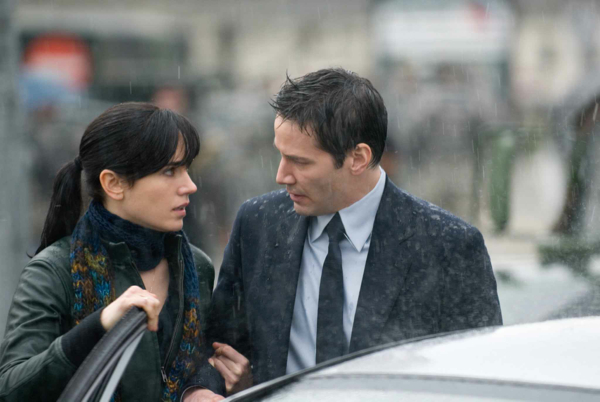Movie review by Greg Carlson
Robert Wise’s 1951 “The Day the Earth Stood Still” is a touchstone of the science fiction genre. A smart, well-paced movie that has managed to transcend the handful of elements that are now outdated (in particular, the “gee whiz” dialogue of Billy Gray’s precocious Bobby Benson), the film boasts solid pacing, a memorable, theremin-infused and oft-mimicked score by Bernard Herrmann, and a trove of images that have become iconic. From robot Gort’s solemn watchfulness to the eerie landing of the flying saucer in Washington, D.C., “The Day the Earth Stood Still” inspired generations of filmmakers and film fanatics. A remake seemed inevitable.
Unfortunately for movie lovers, the new version fails to better the original in any significant way. Instead of addressing what minor narrative deficiencies existed in Edmund North’s screenplay, director Scott Derrickson’s take cranks up the action and the special effects without retaining enough of the original’s thoughtfulness. Fans have debated the ending of the 1951 version for decades, arguing about Klaatu’s warning of the Old Testament-like fury that will be unleashed if the human race continues to misbehave. Does the threat of destruction undercut the free will necessary for global societies to want to change for the good of the planet?
Keanu Reeves, projecting his well-worn, emotion-free persona, is not a bad choice to play alien messenger Klaatu, but he never measures up to the calm dignity of Michael Rennie. Jennifer Connelly assumes the role played by Patricia Neal, although Helen Benson’s occupation has been upgraded from secretary to Princeton scientist. Additionally, Helen’s son Bobby has been replaced by a stepson named Jacob. Unlike the trusting, well-behaved Bobby, Jacob is skeptical of Klaatu, and his distrust of the interstellar emissary contributes to one of the script’s biggest complications.
The 2008 update hangs on to Professor Barnhardt and his blackboard, but John Cleese is given only one scene in which to make an impact. The change of spaceship landing location from D.C. to NYC’s Central Park erases some of the political impact of Wise’s telling, and the smooth disc is now presented as a pulsating, glowing orb. Some credit should be given to the filmmakers for retaining the basic cyclopean design of Gort, even if the new robot has been spending more hours in the gym sculpting his physique. Gort’s role and function parallels his classic raison d’etre, but now he is capable of disintegrating into millions of insectoid nanites that devour whatever crosses their path like a plague of locusts.
More unwelcome is the presence of Kathy Bates’ Secretary of Defense Regina Jackson. Representing the typical lack of sophistication required of the government’s “shoot first and ask questions later” mentality, her scenes are forced and rushed in equal measure, and it is easy to tell that Bates spent very little time on the shoot. Had David Scarpa’s script jettisoned Jackson in favor of spending some time exploring the idea of Klaatu’s fellow travelers (tantalizingly introduced in a clever scene with veteran actor James Hong), it might have opened up more of the planet-wide perspective so ahead of its time in 1951.
